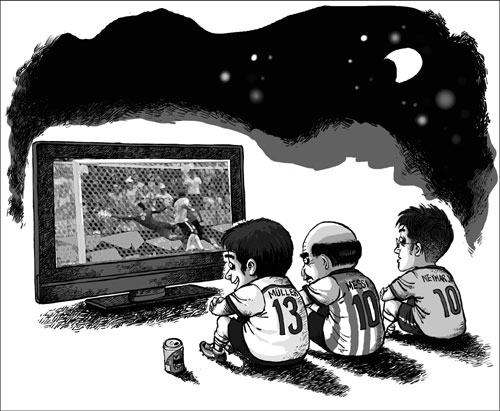Sleepless in Beijing
Updated: 2014-06-20 07:20
By Bai Ping (China Daily)
|
|||||||||||
Soccer World Cup fever has gripped the nation. At first puzzled by Chinese fans' enthusiasm, Bai Ping has become more sympathetic to their plight, reasoning that they are simply seeking out what they can't find at home.
On Sunday evening, when my family and I arrived for a dinner with my in-laws at a Beijing restaurant, I was surprised to see sitting at the head of the table my wife's father who, proudly wearing a soccer shirt, chatted enthusiastically about the soccer World Cup with my brother-in-law.
I was afraid the old man, who is still recovering from an operation for cancer last year, had been staying up to watch the games like young soccer fanatics. The time difference of 11 hours between Beijing and Brasilia has forced local fans to watch the games at unearthly hours, with the majority of games in the tournament starting between midnight and 6 am Beijing time.
But I didn't ask him because mentioning that I forbid staying up late in my own house, even for the World Cup, was not a particularly cool thing to admit. During the dinner, when I checked WeChat on my cell phone, I saw a colleague had posted a picture of her 7-year-old son slouched on a couch, with the proud proclamation: "My son watching his first World Cup game, he's becoming a man!"
As the tournament takes hold of an army of Chinese fans, arguably the world's largest, each match is watched by millions of Chinese. Only days after the World Cup started, the Internet is already abuzz with reports of many students skipping important tests, husbands ignoring wives and excited enthusiasts dying from diseases exacerbated by watching too many games.
There are many theories about the Chinese love for the World Cup men's soccer. While Chinese fans traditionally tended to root for home teams at international competitions due to national pride, their interests have transcended national borders and ideologies thanks to the globalization of sports and sophisticated media technologies.
Many spectators now view televised sports as entertainment similar to watching movies or television dramas. But an unscripted sports event like a soccer game can be far more thrilling, with intense conflicts, suspense and unexpected outcomes.
It's not uncommon to hear educated Chinese women openly admiring well-known international soccer players for their looks and masculinity, as if they were Hollywood heartthrobs.
However, at a deeper level, Chinese soccer, plagued by bribes and corruption, may have also driven droves of local fans to the World Cup and other international tournaments. China qualified for its one and only World Cup finals in 2002, and then failed to score a single goal in three games.
The Chinese players and their managers have squandered the support of their fans and public money, and there is no light at the end of the tunnel. Some online commentators have made droll comments, likening the Chinese obsession with foreign soccer to seeking "vicarious enjoyment".
In my workplace, management meetings can now easily go astray as colleagues bring up the topic of the World Cup matches they have watched. But for the past four years I've never heard them discussing the Chinese Super League, which is often viewed as a national joke.
I'm no soccer fanatic, and I will not stay up late, even on July 13 for the World Cup final. But after trying to analyze the psyche of a typical Chinese fan, I've become more understanding of their enthusiasm for the tournament, which, as certain cynics have pointed out, appears to have no connection whatsoever with Chinese soccer.
As for my aging father-in-law who was born and bred in a northern Chinese city known as the "capital of Chinese soccer", how many more World Cup games will he have the chance to watch?
Contact the writer at dr.baiping@gmail.com
|
Pang Li / China Daily |
(China Daily 06/20/2014 page20)
Today's Top News
China, Germany join hands to drive growth
Meet foreigner breed of workers
Product placement deal backfires
From Westlife to the East
Gambling costs World Cup fans their lives
US supports Ukraine's decision to suspend ceasefire
It's all about making a spectacle
China likely to see 7.5% growth in second quarter
Hot Topics
Lunar probe , China growth forecasts, Emission rules get tougher, China seen through 'colored lens', International board,
Editor's Picks

|

|

|

|

|

|






